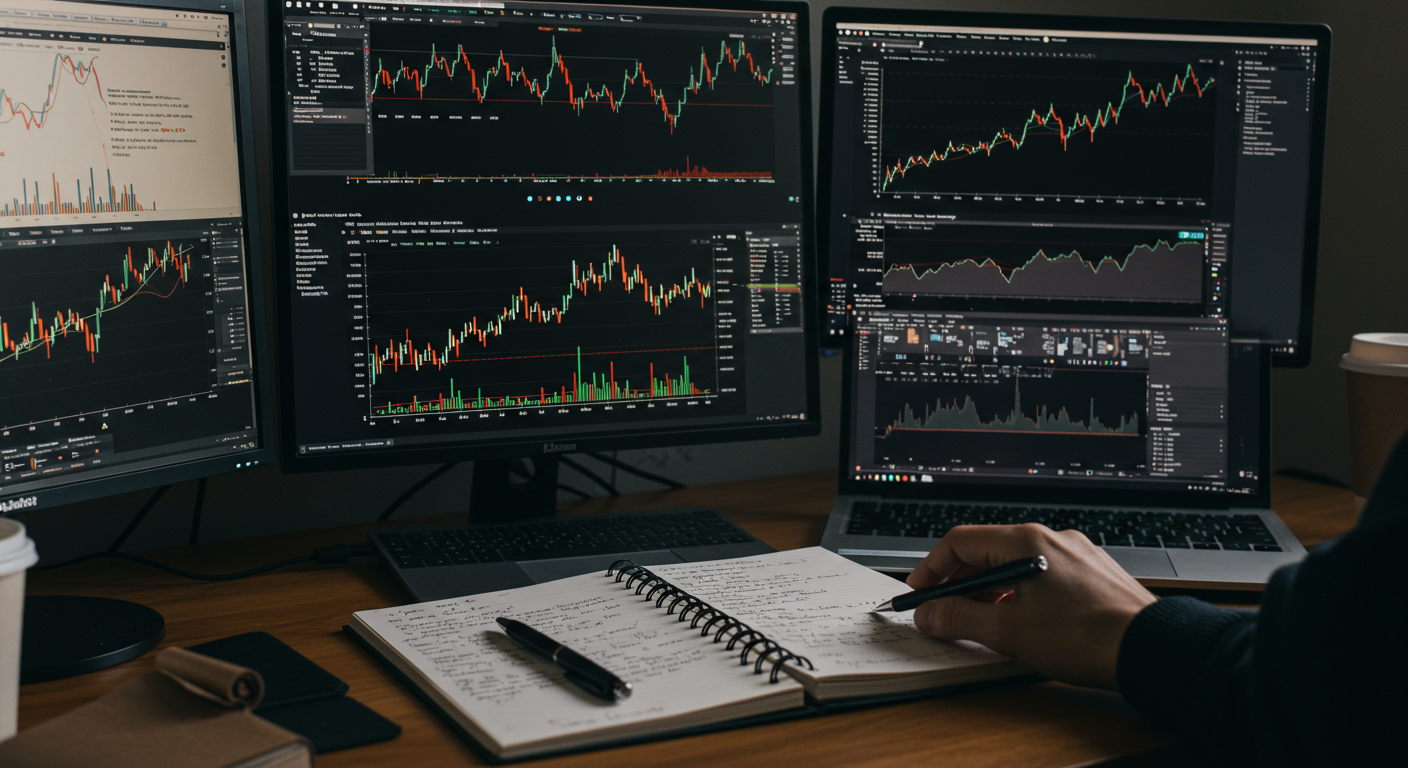That Reddit Post Got Me Thinking...
So, I was scrolling through r/Bitcoin the other day, and I saw this post with a picture that just screamed "Bitcoin maximalism." It was basically saying that Bitcoin always defeats its opponents, and it showed some guy who was hating on Bitcoin a while back. What really caught my eye was the caption: “The user who said 'Keep dreaming' deleted their account today hahaha.”

It’s easy to get caught up in the hype and tribalism in the crypto space. You see Bitcoin going up, and it feels like you're part of a winning team. But as someone who trades crypto internationally, I think it's important to take a step back and look at the bigger picture. Does Bitcoin always win? Is it a sure thing? Or are there things we should be aware of? That's what I want to explore in this article. I want to break down some of the arguments for and against Bitcoin's long-term dominance, especially from the perspective of someone trading outside the US. I have personally seen similar scenarios play out many times, and the reality is often more nuanced than those who are already 'winning' may see.
Here's What's Really Going On
Let's unpack that Reddit post a bit more. The underlying sentiment is that Bitcoin has consistently proven its naysayers wrong. And to some extent, that's true. Bitcoin has survived numerous crashes, regulatory crackdowns, and challenges from competing cryptocurrencies. It’s shown a remarkable ability to bounce back and reach new all-time highs. This resilience is a big part of what attracts people to Bitcoin. It feels like a safe haven in a volatile market. People see it as digital gold, a store of value that can hold its own against inflation and economic uncertainty. It is easy to see why one might feel secure holding an asset that they believe will be valuable in the long term.
However, the fact that someone deleted their account after disliking on Bitcoin in the past only demonstrates a singular, anecdotal data point. People delete social media accounts for a whole host of reasons, and it's impossible to know if that person's actions were solely a consequence of feeling like they were wrong on Bitcoin.
But here's the thing: just because Bitcoin has overcome challenges in the past doesn't guarantee it will continue to do so in the future. The crypto landscape is constantly changing, and new technologies and competitors are emerging all the time. We need to be realistic about the risks and challenges that Bitcoin faces. To ignore those challenges would be naive, or worse - financially irresponsible.
What This Means For Your Crypto Portfolio
Okay, so what does all this mean for you and your crypto portfolio? First, it's important to diversify. Don't put all your eggs in one basket, even if that basket is Bitcoin. While Bitcoin has the longest track record and the largest market cap, it's not the only game in town. There are other cryptocurrencies and blockchain projects that offer different features and potential for growth. Think about Ethereum, for example, which is the foundation for many DeFi applications and NFTs. Or consider some of the newer altcoins that are trying to solve specific problems in the crypto space. Spreading your investments across different assets can help reduce your overall risk. This is especially true if you're trading from outside the US, where access to certain assets may be limited or restricted. Regulations on crypto are currently in flux in many jurisdictions, and it is wise to prepare for any regulatory changes that may impact your ability to access various crypto assets.
Second, do your own research. Don't just blindly follow the hype or listen to what some random person on Reddit tells you. Take the time to understand the technology behind Bitcoin and other cryptocurrencies. Learn about the potential risks and rewards. Read whitepapers, follow industry news, and talk to other traders. The more you know, the better equipped you'll be to make informed investment decisions. It is helpful to also bear in mind that the vast majority of people on social media are not professional financial advisors, and you should not treat their opinions as such.
The Risks Nobody Likes to Talk About
Let's be real, there are some serious risks associated with Bitcoin that people often downplay. One of the biggest is regulatory risk. Governments around the world are still trying to figure out how to regulate cryptocurrencies. And depending on what they decide, it could have a significant impact on the price and adoption of Bitcoin. For example, if a major country like the US or China were to ban Bitcoin, it could trigger a massive sell-off. While a complete ban is unlikely, stricter regulations could make it more difficult to buy, sell, and use Bitcoin. These are all things you need to consider, especially if you're trading from a country with a less-developed regulatory framework.
Another risk is technological obsolescence. While Bitcoin has proven to be remarkably resilient, it's not immune to being overtaken by newer, more innovative technologies. There are already cryptocurrencies that offer faster transaction times, lower fees, and greater scalability than Bitcoin. While Bitcoin is constantly being upgraded and improved, there's no guarantee that it will be able to keep up with the pace of innovation in the crypto space. This is why it's important to stay informed about the latest developments and be prepared to adapt your investment strategy if necessary.
Finally, there's the risk of losing your private keys. If you lose access to your private keys, you lose access to your Bitcoin. There's no central authority or customer support line you can call to get them back. This is why it's crucial to take security seriously and store your private keys in a safe place, such as a hardware wallet. Also, remember to never share your private keys with anyone, no matter how trustworthy they may seem. A reputable crypto exchange will never ask you for your private keys, so it should be a major red flag if anyone ever asks you for your private keys.
If You're Trading Crypto Outside the US...
If you're trading Bitcoin from outside the US, there are some additional things you need to keep in mind. First, tax laws vary widely from country to country. Some countries have clear guidelines on how to tax Bitcoin gains, while others are still figuring it out. It's important to understand the tax laws in your jurisdiction and comply with them. Otherwise, you could face penalties or even legal trouble. Consult with a tax professional who is familiar with cryptocurrency regulations in your country.
Second, access to exchanges and trading platforms may be limited depending on where you live. Some exchanges may not be available in your country, or they may have restrictions on the types of assets you can trade. You may need to use a VPN or other tools to access certain platforms. However, be aware that using a VPN can sometimes violate the terms of service of some exchanges.
Finally, be aware of currency exchange rates and fees. When you're trading Bitcoin in a currency other than USD, you'll need to convert your local currency to Bitcoin and back again. This can involve exchange rates and fees that can eat into your profits. Look for exchanges that offer competitive rates and low fees. Alternatively, you may want to use a stablecoin pegged to your local currency to avoid these fluctuations. Always compare the fees charged by different exchanges before choosing which one to use.

Actually Doing This Stuff: A Quick Guide
Okay, so how do you actually put all this into practice? Let's break it down into a few simple steps:
- Choose a reputable exchange: Look for an exchange that is licensed and regulated in your jurisdiction, has a good track record, and offers a wide range of assets to trade. Changelly is a great option for beginners due to its user-friendly interface, while KuCoin is better suited for more experienced traders due to its advanced trading features.
- Set up a secure wallet: Once you've purchased Bitcoin, transfer it to a secure wallet that you control. A hardware wallet is the most secure option, but a software wallet or exchange wallet can also be used.
- Diversify your portfolio: Don't put all your eggs in one basket. Invest in a variety of different cryptocurrencies and blockchain projects.
- Do your research: Stay informed about the latest developments in the crypto space and make informed investment decisions.
- Manage your risk: Don't invest more than you can afford to lose. Use stop-loss orders to limit your potential losses.
- Comply with tax laws: Understand the tax laws in your jurisdiction and comply with them.
- Stay safe: Protect your private keys and never share them with anyone.
By following these steps, you can increase your chances of success in the Bitcoin market and minimize your risks.
My Personal Take on All This
So, does Bitcoin always win? I don't think so. I think it's more accurate to say that Bitcoin has proven to be remarkably resilient and has a good chance of remaining a major player in the crypto space for years to come. But it's not a sure thing. There are risks and challenges that need to be considered. As an international trader, I think it's important to stay diversified, do your own research, and manage your risk. Don't just blindly follow the hype or listen to what some random person on Reddit tells you.
Maybe I'm wrong. Maybe Bitcoin will continue to defy the odds and reach new all-time highs. But I'd rather be prepared for the worst-case scenario than be caught off guard. That's just my personal philosophy when it comes to trading. I hope this article has given you some food for thought and helped you make more informed decisions about your own crypto portfolio. Trading is a complex and nuanced undertaking, and no single asset is guaranteed to always appreciate in value.